- Home
- Tim Powers
Skies Discrowned and An Epitaph in Rust
Skies Discrowned and An Epitaph in Rust Read online
PRAISE FOR THE WRITING OF TIM POWERS
“Philip K. Dick felt that one day Tim Powers would be one of our greatest fantasy writers. Phil was right.” —Roger Zelazny
“Powers is a fine writer with an elegant and imaginative style, and the things that happen in his story are just weird enough to make us wonder if everyday life might not be as normal as it seems.” —The Philadelphia Inquirer
“A Tim Powers science fiction novel never fails to titillate and elucidate with the dark and the bizarre, and all with such original, eccentric color and style.” —Los Angeles Times
Earthquake Weather
“Influenced by SF master Philip K. Dick, Powers taps into Dick’s surrealistic style to great success.” —Library Journal
Expiration Date
“Expiration Date is fascinating. . . . It’ll have you turning pages as much for his sheer inventiveness as for the plot . . . for the remarkable frisson that sparks from the page, the playfulness of the language.” —The Magazine of Fantasy & Science Fiction
“Only a writer of Powers’ skill and imagination could make this goulash of outlandish material work. He blends every outré ingredient into a satisfying and cohesive whole, so that the reader has no choice at the end but to think: ‘Of course. Everything fits. I can see that now.’ Expiration Date ranks with his best work.” —San Francisco Chronicle
The Skies Discrowned and An Epitaph in Rust
The Complete Novels
Tim Powers
Contents
The First Concrete Evidence
The Skies Discrowned
Book One: The Painter
Chapter 1
Chapter 2
Chapter 3
Chapter 4
Chapter 5
Chapter 6
Chapter 7
Book Two: The Swordsman
Chapter 1
Chapter 2
Chapter 3
Chapter 4
Chapter 5
Book Three: The King
Chapter 1
Chapter 2
Chapter 3
Epilogue
An Epitaph in Rust
Book One: Rufus Pennick
Chapter 1: Brother Thomas
Chapter 2: A Day in the City
Chapter 3: The Misunderstanding in Pershing Square
Chapter 4: A Night at the Blind Moon
Chapter 5: The Girl at the Far End of the Row
Chapter 6: The Dark-Rum Queen
Book Two: Nathan Gladhand
Chapter 7: A Bad Dinner at the Gallomo
Chapter 8: The Head in the Box
Chapter 9: Deductions in Room Four
Chapter 10: “With This Memory Bank…”
Chapter 11: The Last Night of the World
About the Author
The First Concrete Evidence
by Tim Powers
IN FEBRUARY OF 1975 I was twenty-two years old, just finishing up my Bachelor of Arts in English at California State University at Fullerton, and beginning to take classes that would apply to getting a Master’s degree; my vague goal was to be a college literature professor. I had known Jim Blaylock for three years, and we had already invented our imaginary poet William Ashbless, who has occupied a fair amount of our time ever since. And Blaylock and I had known K. W. Jeter for a year or so, and the three of us frequently got together at a bar in Orange called O’Hara’s, where we would discuss the stories we were writing.
We were college students, so we spent a lot of time in cheap bars and going to movies like Bergman’s Scenes From a Marriage, Russell’s Mahler, and Antonioni’s The Passenger (none of which I’d see again now; though de Palma’s The Phantom of the Paradise, which impressed me then, still impresses me). Among the books we were admiring were Thompson’s Fear and Loathing in Las Vegas, Donleavy’s The Ginger Man, and Cary’s The Horse’s Mouth (all of which still strike me as admirable). Bob Dylan’s Blood on the Tracks was a new and splendid album (and now it’s old and splendid). When friends got married, the people setting up the weddings often strove for “the Godfather look.”
Blaylock and I were each working on a long, plotless novel—mine was called Dinner at Deviant’s Palace (which had not much similarity to the book eventually published with that title—I just liked the sound of the phrase, which I had derived from Robert Downey’s movie Greaser’s Palace and E. R. Eddison’s book A Fish Dinner in Memison), and Blaylock’s was called The Chinese Circus. Jeter—a more accomplished writer—had already finished Dr. Adder, and also a novel called Seeklight, which he had, dazzlingly, sold to a publisher. It was to appear in July.
The publisher was Harlequin Books, famous for their sappy-looking romance paperbacks; but they were going to try out a science fiction line, edited by Roger Elwood, who had edited any number of respectable anthologies.
And Jeter told us that the new line was looking for several more authors to discover! Blaylock and I immediately shelved our interminable novels and began scribbling fresh things.
I wrote about 4,000 words of a novel, and an outline, and I showed it to Jeter—and he told me that it was no good, because nothing happened in it. This was true, actually—these Harlequin novels had to be precisely 55,000 words, which seemed like an awful lot to me—so I was starting slow, wary of using up my whole outline’s-worth of events too quickly. I suppose I would have said I was “developing my characters” or something, but the result was that for three chapters my characters hardly did more than eat lunches and… well, all I can recall now is the lunches. Talk, too, I expect—“filling in background,” I might have said by way of excuse. I can’t go back and check, because I threw the chapters into the fireplace one day.
“Start where the action starts,” Jeter told me. This seemed like a spendthrift way to write a book, but I tried it his way and in March I put the chapters-and-outline in the mail.
And on Tuesday the 22nd of April, 1975, I got a letter from Elwood. He said he liked what I sent him, but needed to see one more chapter, since I was an unknown, before he could send me a contract. Of course I agreed to write another chapter, and promised he’d have it in a week.
Like many young English majors, I was keeping a “journal” in those days—and I see I wrote on April 29, “this letter was the first concrete evidence I’ve ever had to believe that my writing is at all worthwhile. Even if Elwood should decide that subsequent chapters were terrible, I’d know I’m good enough to interest a big editor.
“So I wrote the fourth chapter, typed it last night, and mailed it early this morning. Air mail. If he doesn’t take it, I’m in a bit of inconvenience. I’ve spent a week writing the chapter, and would have to write two term papers (20 and 10 pp.) and read four books and do a considerable bit of research, all in two weeks. If he takes it, which I think he will, I’ll take an incomplete in those two classes and devote my time to writing. I’ll keep my political science class because when it’s finished I’ll have my B.A.; and I’ll keep fencing because it takes no time outside of class.”
And on the 5th of May Elwood did accept it, with a deadline of August 15—and so I quit the classes I’d been taking toward a Master’s degree. In my journal I noted, “I am, for the time being, at least, a writer. I’m enjoying writing the thing; working from a previously-worked-out outline eliminates the kind of snags I was running into in Deviant’s Palace—I always know more-or-less what’s going to happen next.”
By the beginning of June I was half done with it, and by the beginning of July I was confident enough to take a long weekend off and drive up to San Francisco, with Jim Blaylock and his wife Viki, to attend the Westercon science fiction convention. Roger Elwood was ther
e, and we learned that Harlequin’s science fiction line was to be called “Laser Books.” As I noted in my journal for the 5th of July, “Jim and I agreed that almost anything would sound better, but what the hell.”
On August 7 I finished typing the handwritten manuscript—which now had a title, The Skies Discrowned—but somehow I still hadn’t received a contract for the book. Elwood had been assuring me for months that the contract would be along very soon, any day, in fact—but in the meantime I didn’t have it, and didn’t want to send the completed manuscript to him until I did have it. What if, I thought, he doesn’t like the book? Why would he issue a contract for a book he knows he doesn’t like?
So I told him I needed to have the contract before I’d send the manuscript to him.
And on August 9th, I went to a party at Philip K. Dick’s house. I hadn’t seen him since about mid-’73, though we’d been good friends for a year or so before that; he had got married, and become a bit of a hermit. But his marriage was looking unsteady now—he was “scheming on” some girl at the party—and we were quickly back on the old footing.
I finally mailed the manuscript to Laser Books after getting a Western Union Mail Gram from Elwood dated the 25th of August, assuring me that a contract would definitely be along very shortly; and he accepted the book, and in fact before the end of the month the contract did arrive.
I showed it to Phil Dick, and he told me not to sign it. He said Harlequin was keeping the foreign rights, and this wasn’t acceptable. I thanked him, but when I got home I signed the contract and put it in the mail.
What, after all, did I care about foreign rights? If it were to have no foreign editions, or if it had hundreds of foreign editions for which I would be paid nothing, didn’t concern me at all. I could write other books, and deal sensibly with the foreign rights on them. All I wanted right now was to get the thing safely published.
And it duly appeared in May of the next year. On the cover, along with my name and the title, were the words “General Editor Roger Elwood,” and Phil Dick was with me when I first found copies at a bookstore. I bought several, and Phil told the clerk, “This guy wrote this book!” The clerk smiled and looked at the cover and said, “Congratulations, Mr. Elwood!”—which Phil thought was pretty funny.
And I wrote a second book for Laser, An Epitaph in Rust. This one was published in so grossly rewritten a form that I resolved not to sell to Laser again, and in any case Harlequin folded the line soon after, having decided that science fiction couldn’t measure up to romances.
For a few years after that I was back to sending manuscripts to publishers and getting them rejected, but the publication of these two books (the correct versions of which you have here, with no intrusive editing) had effectively deflected me from wanting to be a college literature professor; I didn’t go back to graduate school. And eventually I sold a third book, to Lester del Rey, and then a fourth to Beth Meacham at Ace Books—but if it weren’t for K. W. Jeter and Roger Elwood, and the heady experience of seeing these first two books in print, I’d today be teaching “Twain to Modern,” and “Analysis of Literary Forms,” and maybe—with a wistful air, I like to think!—“Creative Writing.”
—Tim Powers
San Bernardino, California
October 2, 2003
To Roy A. Squires
The Skies Discrowned
Though the many lights dwindle to one
light,
There is help if the heavens have one; Though the skies be discrowned of the sunlight
And the earth dispossessed of the sun,
They have moonlight and sleep for repayment,
When, refreshed as a bride and set free, With stars and sea-winds in her raiment, Night sinks on the sea.
—A. C. Swinburne
BOOK ONE
The Painter
CHAPTER 1
THE CROWD IN FRONT of the Ducal Palace always fascinated Francisco Rovzar. The great stone arch of the barbican seemed to frame a picture of all human endeavor and misery. Here a curbside magician produced gouts of flame from his mouth, there a cowled priest shambled along, flicking passersby with holy water from a leather bag at his belt. A knot of moaning women waved rolled, ribbon-bound petitions at the procession of judges who hurried out of the cleric’s gate to get some lunch before the afternoon sessions commenced. Grimy children in tattered clothes or none at all howled and chased each other through the gutters. Smoke from the fires of sausage vendors and jewelsmiths curled in gray ribbons up into the blue sky.
Francisco prodded his horse forward, through the gate. The guard recognized him and waved his slingshot amiably. Francisco waved back at him, then turned to make sure his father was following. The old man was rocking unsteadily in the saddle, muttering and frowning fiercely. His horse was stopped.
“Come on, Dad, we’re going in,” Francisco called. His father gave the horse a spasmodic kick, and it trotted up beside Francisco’s mount. “Pull yourself together, Dad,” said Francisco worriedly.
“I’m all right,” the elder Rovzar said with an exaggerated nod. “Hell, when I did that portrait of Bishop Sipstand, I was so drunk I couldn’t see him. I painted him from memory, and he said it was the… the best painting he’d ever seen. Don’t worry about me, Frank.”
Frank smiled and shook his head, but he was still uneasy. Only two hours ago he had dragged his father out of a tavern in Calvert Lane, and it had required a cold shower and four cups of coffee even to get the old man as coherent and presentable as he was now. He always did love to drink, Frank thought, but since Mom died he’s been getting drunk all the time. He’s still the finest portrait painter within a hundred planets, but how long can that last?
They were within the walls of the palace now, the horses’ hooves clicking on cobblestones. A footman sprinted up to them and bowed.
“If you’ll let me take charge of your horses, you can go right in. The Duke is ready to see you.”
“Thank you,” said Frank, dismounting. He pushed back his straight black hair and set about getting his father out of the saddle. “Hah! Carefully now!” the old man barked as he began to slide off the horse’s starboard side. “That’s it, now! Feet first, feet first!” Frank caught him and set him upright on the pavement, with a smoothness born of much practice.
The footman regarded the pot-bellied, gray-haired old master with amused contempt. “You’re late,” he smirked, “but I guess I needn’t inquire why.”
“No,” said Francisco, turning on him savagely. “Not unless it’s a part of your modest duties to question the Duke’s guests.”
“I beg your pardon, sir,” said the footman, suddenly meek. “I certainly never—”
“Take the horses,” interrupted Frank, having pulled the saddlebags off his mount. The footman took the two sweaty horses away, and Frank led his unsteady parent across the yard to the open doors of the keep. A guard in blue-steel armor, who carried an automatic rifle slung over his shoulder, escorted them up a carpeted flight of stairs and down a hallway, to a pair of doors in whose mahogany surfaces was carved the story of Frankie and Johnnie.
The guard yanked a bell pull on the wall and discreetly withdrew. In a moment the doors were opened by a young, tow-headed page who bowed and motioned Frank and his father into the room.
“Ah, there you are, Rovzar!” boomed the Duke Topo from a splendid tall chair of mosaic-inlaid ebony that was set in the center of the room. His bulky person was enclosed in a baggy pair of blue silk trousers and a green velvet coat. Ringlets of hair, so shiny as to seem varnished, covered his head and clustered about his shoulders.
“Your Grace,” acknowledged the older Rovzar. Father and son both bowed. The room was lit by tall, open windows in the eastern wall; bookcases hid the other three walls, and a desk and chair were set in one corner. In the middle of the room, facing the chair in which the Duke sat, was a wooden stand supporting a framed canvas ten feet tall and five feet wide. The canvas was a nearly-finished portrait of the
Duke, done in oils. It presented him dressed and seated as he now was, but it conveyed a dignity and strength, even a touch of sadness, that were presently lacking in the model.
“You’re looking a bit jaded, Rovzar,” the Duke observed. “Feeling all right, I trust?”
“Very well, thank you, and all the better for your Grace’s concern,” said the old painter. Frank stared at his father, admiring, as he always did, the man’s ability to shake off the effects of alcohol when the situation demanded it.
“You think you’ll finish it this session?” asked the Duke.
“It’s not unlikely,” answered Frank’s father. “But I can’t say for sure, of course.”
“Of course,” nodded the Duke.
Old Rovzar put his hand on the young man’s shoulder. “Okay now, Frank,” he said, “you set up the palette and turp and oil while I say hello to the picture.” He crossed to the painting and stood in front of it, staring intently. Frank unbuckled the saddlebags and opened the boxes they held. He laid out a dozen crumpled paint tubes and poured linseed oil and turpentine into two metal cups. He unwound a rubber band from a bundle of brushes and set them in another cup. The page, standing beside the sitting Duke, looked on with great interest.
The double doors opened and a slim, pale young man entered. He wore powder blue tights and a matching shirt with ruffles at the throat. A fancy-hilted sword hung at his belt.
“Costa, my boy!” greeted the Duke. “Finished with your piano lesson so soon?”
“I despise pianos,” the Prince informed him. “Is he still working on that picture?” He walked over and peered at the canvas closely. “Hmmm,” he grunted, before turning and walking to the window. His attitude implied that this painting wasn’t bad, in a quaint way, but that he’d frequently seen better. Francisco remembered the Prince’s tantrums after he had been told that he was not to be included in the painting—for a week Costa had sulked and, in the months since, tried to make it clear that he regarded Rovzar as an inferior painter.

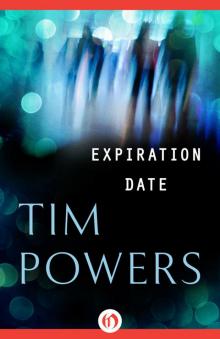 Expiration Date
Expiration Date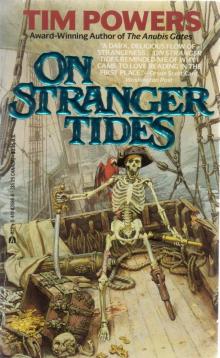 On Stranger Tides
On Stranger Tides Earthquake Weather
Earthquake Weather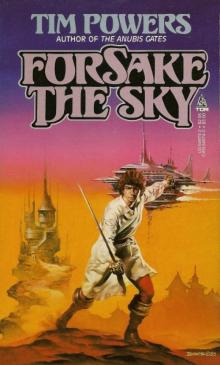 Forsake the Sky
Forsake the Sky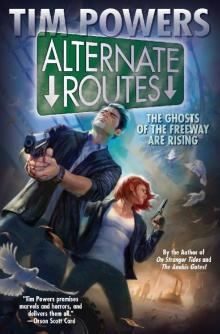 Alternate Routes
Alternate Routes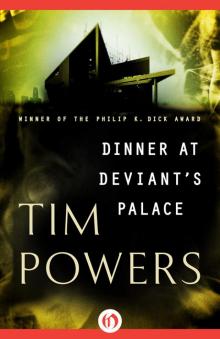 Dinner at Deviant's Palace
Dinner at Deviant's Palace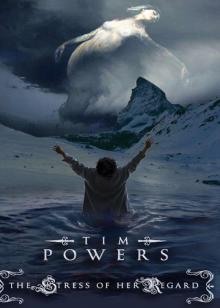 The Stress of Her Regard
The Stress of Her Regard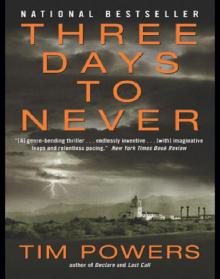 Three Days to Never: A Novel
Three Days to Never: A Novel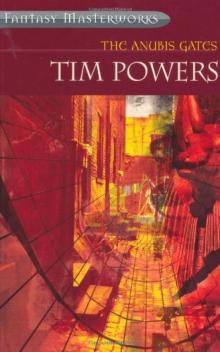 The Anubis Gates
The Anubis Gates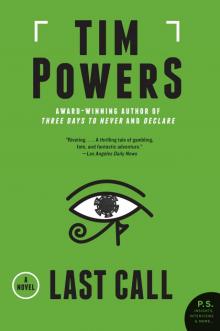 Last Call
Last Call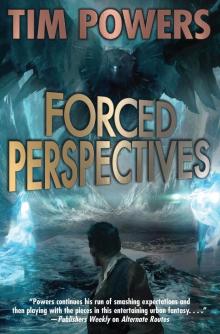 Forced Perspectives
Forced Perspectives Strange Itineraries
Strange Itineraries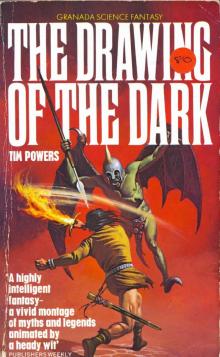 The Drawing of the Dark
The Drawing of the Dark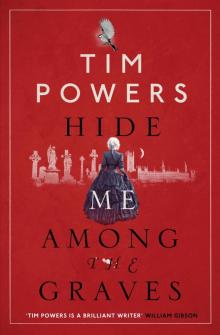 Hide Me Among the Graves
Hide Me Among the Graves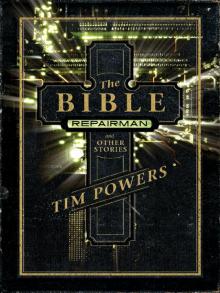 The Bible Repairman and Other Stories
The Bible Repairman and Other Stories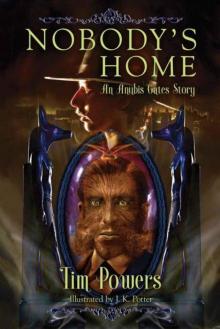 Nobody's Home: An Anubis Gates Story
Nobody's Home: An Anubis Gates Story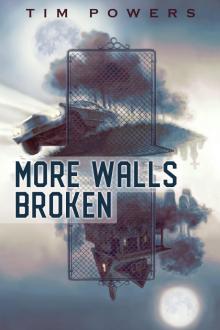 More Walls Broken
More Walls Broken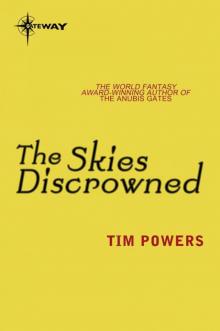 The Skies Discrowned
The Skies Discrowned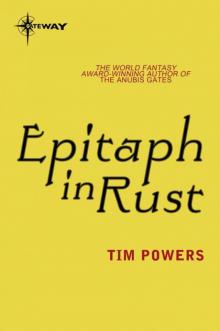 Epitaph in Rust
Epitaph in Rust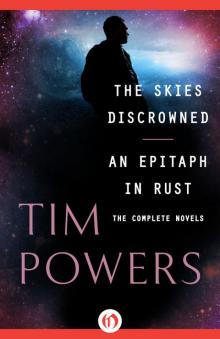 Skies Discrowned and An Epitaph in Rust
Skies Discrowned and An Epitaph in Rust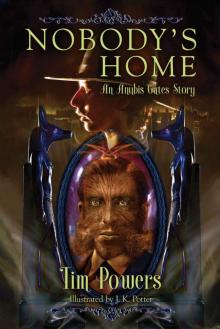 Nobody's Home
Nobody's Home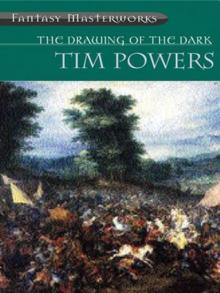 Drawing of the Dark
Drawing of the Dark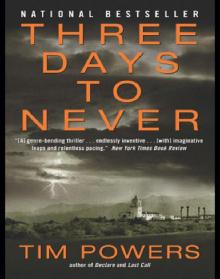 Three Days to Never
Three Days to Never